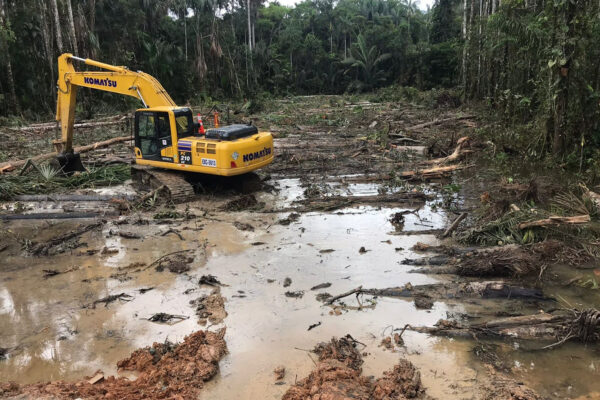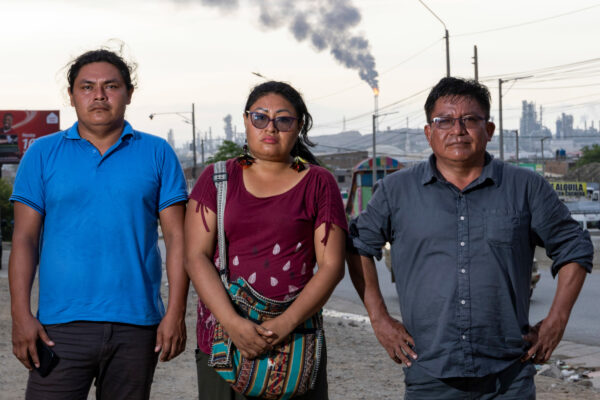I hope while you hear me speak, I won’t make you terrified – maybe a little – but I’ll also inspire you to join us, and to join indigenous peoples in resistance … for the existence and survival of all of us.
Leila Salazar-López
Unprecedented fires, deliberately set to expand industrial agriculture and other extractive development, are burning across the Amazon, a dangerous escalation of the global climate emergency.
Scientists warn that the Amazon is reaching “the tipping point” of ecological collapse, but indigenous movements across the region are resisting and calling for international solidarity to help them defend their rights and territories.
For thousands of years, indigenous peoples have protected their sacred ancestral territories. We all must stand with them to protect and restore the bio-cultural integrity of the Amazon, because our collective future depends on it.
Excerpts:
You probably heard about the fires … raging across the Amazon in Brazil, and in Bolivia, and across the entire Amazon, and they’re devastating. They’re catastrophic. Combined with the threats across the Amazon – oil and gas and agribusiness and deforestation and degradation and mining, and mega dams – these threats and the fires combined with climate change could lead the Amazon to a tipping point of ecological collapse. But can we turn this around? That’s the question.
We need the Amazon for global biodiversity. We need the Amazon for protecting our climate. You might have heard of the Amazon as the largest tropical rainforest. It also has one of the largest rivers on the planet, and above… the Amazon River, are the flying rivers, which are the atmospheric rivers which regulate our global weather system. Without the flying rivers, our entire global weather system is destabilized. And the reason why the flying rivers can be taken off course is because of increased deforestation…fires, and many other threats.
When you walk with indigenous peoples in the rainforest, and they can name every single plant and tell you every single property – for food, for medicine, for housing, for clothing, for shelter – then you know… they have a millennial knowledge that needs to be protected.
There are over 400 distinct indigenous nations, peoples throughout the Amazon rainforest, and they are the best protectors of the Amazon. They are the best protectors of biodiversity on our planet… The United Nations says that 80% of the global biodiversity on this planet is on indigenous peoples lands. So that’s why we are working to stand with indigenous peoples to protect biodiversity, to protect the climate, and to protect life.
Let’s make no mistake. The fires in the Amazon are not wildfires… They are intentional. They are malicious. They are set by government policies, and economic policies and drivers…
In Brazil alone there’s been over 100,000 fires just this year alone… three million hectares burned. In Bolivia alone, there’s been over five million hectares burned. Just this year… Forest that has been there for thousands and thousands of years. And we’re not gonna get that back anytime soon. What we have to do now is protect it and restore it as quicky as possible.
A lot of people ask us, well, who’s responsible?… It is the Bolsonaro government. Let’s not make light of it. The Brazilian government has… not only the rhetoric, but the policies to destroy the Amazon to make way for economic development, to make way for agribusiness, to make way for soy and cattle, to make way for mining. It is their policy to destroy the Amazon for economic development. So it’s not a mistake. It’s not a wildfire. It’s intentional, and malicious, and destructive… The moment Bolsonaro got in office, he rolled back the rights of indigenous peoples, merged environmental and agribusiness ministries to intentionally destroy the lands and the rights of indigenous peoples.
We have been standing strong with indigenous peoples, APIB, the indigenous movement of Brazil, to say no – To stand up for rights, to stand up for lives, to stand up for territories.
If you care about the forest, if you care about human rights, if you care about indigenous rights, if you care about the climate, then don’t trade in high-risk commodities. No government, no corporation, no retailer, and no bank should be doing this. And that’s why we joined together with APIB to put out a report called Complicity in Destruction to highlight and expose these corporations, big agribusiness traders like ADM, and Bunge, and Cargill, and retailers like Costco, and Walmart, and financial institutions like Chase, and Santander, and BNP Paribas. And asset managers… like Blackrock.
You may have heard about Chevron in Ecuador or Occidental Petroleum in U’wa territory, or in northern Peruvian Amazon… It is the most biodiverse, culturally diverse part of the Amazon, and it’s in the western Amazon. And these are the fossil fuel reserves… that these companies and governments would like to get their hands on.
It’s indigenous people, it’s Sarayaku, it’s women defenders of the Amazon against extraction – it’s indigenous movements that we’re working with to protect the Amazon, to restore the Amazon, to advance indigenous solutions, to advance and support climate justice. And we’re doing this together. We’re doing this as NGO allies, we’re doing this as movements in the climate justice movement and indigenous rights movement, in the women’s movement. We’re doing this together.













